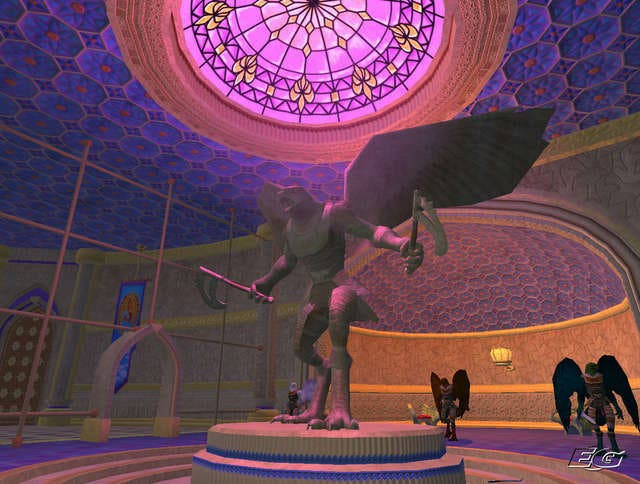Gold Trading Exposed: The Developers
The Carrot and the Stick?
"We keep developing technologies to combat it, but it's like an arms race, we stop bots, they improve their macros, we stop them, they improve again. The longer we keep doing this, the harder it's going to be to keep stopping bots. If we don't break that vicious cycle now," he maintains, "it would just keep getting worse and worse. It could reach a point where macro software becomes undetectable."
During 2006, Jagex banned accounts carrying RuneScape gold and items worth over 200 billion. During 2007, it banned over 525 billion, which had a real-world value of over USD 2.6 million - an increase of over 250 per cent. "At that rate of growth," he said, "we'd be looking at banning over 8 trillion in 2010 - that's 8,000 billion - which has a real-world value of over USD 40 million. It's an almost unbelievably high number, but it hammers home the sheer size of the problem we are facing and why we had to take action against it."
In EverQuest, Sony's Brad Wilcox says the company has worked on two fronts to tackle the problem. "First of all we have formed a team of game experts that are able to find, track and then ban those that are participating in this activity. We call this team the 'N.U.G.I.T', which stands for Norathian Underground Gnome Investigation Team.
"Together with the game developers, who have created various tools and logs, the individuals on this team spend their day finding and tracking individuals that participate in RMT, remove the ill-gotten gains from the worlds and ban the accounts of these individuals. On the other side, we have put additional security measures in place to track the use of perceived stolen credit cards, so that accounts cannot be created. Last year alone we banned over 135,000 accounts."
Bowing to the market
It's certain that MMO developers are talking to one another about the best methods of tackling the problem. "I know that other companies in the industry have the same issues," says Sony's Brad Wilcox. "We have met and talked with them and shared best practices."
"These gold-sellers are businessmen. They're in it for the money and are going to be looking at the bottom line: their profits," agrees Adam Tuckwell of Jagex. "The key phrase is 'not profitable'. We're changing our game in a way that doesn't negatively affect its gameplay, but which makes real-world trading not worth the effort."
He mentions that Jagex has looked at any number of different possible solutions to the spammers and bots. "We read independent studies and spoke with other people in the MMORPG industry. Ultimately, the consensus was that the only way to remove the real-world trading market was to develop your game so you cannot make unbalanced trades.

"An unbalanced trade is where one player trades something of value to another player, but does not receive something back of roughly equal value. Real-world traders have used this method to trade millions of gold pieces in exchange for nothing in game, as they will already have been paid in real money. Removing unbalanced trade will mean real-world traders can't do this, so there is no way for them to deliver gold to buyers - and if you can't sell gold, why bother farming it in the first place?"
"The difficult part was not the removal of unbalanced trade," he says, "but the creation of new content to replace what would be lost. This change was not taken lightly, we've exhausted all the alternatives. We've tried countless ways to defeat real-world trading and considered many other options to end this problem. Unbalanced trade is going from RuneScape; if anything gets lost alongside it we can find it again, new and improved, with the help and support of our players." Whatever a player now trades directly in the game has to be traded with an item of similar value.
This is a substantial change, says Tuckwell, and in order to keep the game enjoyable and ensure that trade could still happen, Jagex introduced the 'grade exchange', essentially a stock exchange, for players to sell their items to the highest bidder. "This allowed players to buy and sell items at market rates, while removing the RWT threat," he claims.
Other studios have taken the concept even further. Recently CCP designed and introduced the "Pilot's License Extension" (or PLEX) system to EVE. This allows gamers to turn their game-time codes into two 30-day in-game items (the Pilot's License Extensions). They can then trade or sell these items for in-game currency, ISK.